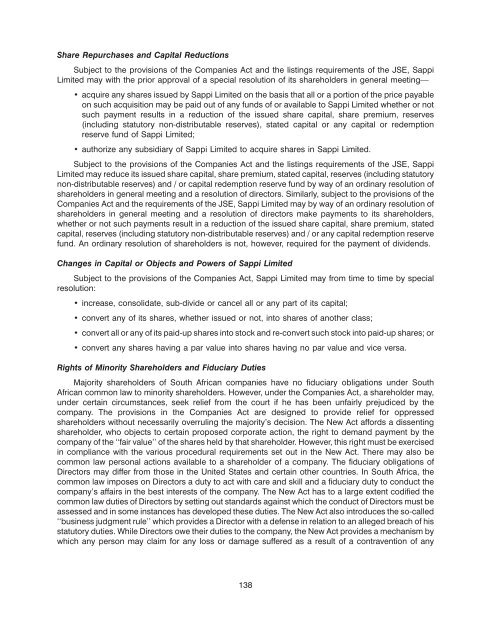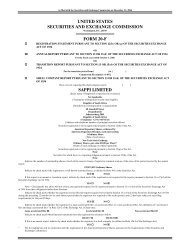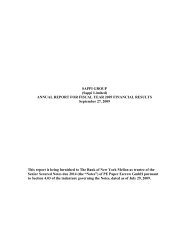Create successful ePaper yourself
Turn your PDF publications into a flip-book with our unique Google optimized e-Paper software.
Share Repurchases and Capital Reductions<br />
Subject to the provisions of the Companies Act and the listings requirements of the JSE, Sappi<br />
Limited may with the prior approval of a special resolution of its shareholders in general meeting—<br />
acquire any shares issued by Sappi Limited on the basis that all or a portion of the price payable<br />
on such acquisition may be paid out of any funds of or available to Sappi Limited whether or not<br />
such payment results in a reduction of the issued share capital, share premium, reserves<br />
(including statutory non-distributable reserves), stated capital or any capital or redemption<br />
reserve fund of Sappi Limited;<br />
authorize any subsidiary of Sappi Limited to acquire shares in Sappi Limited.<br />
Subject to the provisions of the Companies Act and the listings requirements of the JSE, Sappi<br />
Limited may reduce its issued share capital, share premium, stated capital, reserves (including statutory<br />
non-distributable reserves) and / or capital redemption reserve fund by way of an ordinary resolution of<br />
shareholders in general meeting and a resolution of directors. Similarly, subject to the provisions of the<br />
Companies Act and the requirements of the JSE, Sappi Limited may by way of an ordinary resolution of<br />
shareholders in general meeting and a resolution of directors make payments to its shareholders,<br />
whether or not such payments result in a reduction of the issued share capital, share premium, stated<br />
capital, reserves (including statutory non-distributable reserves) and / or any capital redemption reserve<br />
fund. An ordinary resolution of shareholders is not, however, required for the payment of dividends.<br />
Changes in Capital or Objects and Powers of Sappi Limited<br />
Subject to the provisions of the Companies Act, Sappi Limited may from time to time by special<br />
resolution:<br />
increase, consolidate, sub-divide or cancel all or any part of its capital;<br />
convert any of its shares, whether issued or not, into shares of another class;<br />
convert all or any of its paid-up shares into stock and re-convert such stock into paid-up shares; or<br />
convert any shares having a par value into shares having no par value and vice versa.<br />
Rights of Minority Shareholders and Fiduciary Duties<br />
Majority shareholders of South African companies have no fiduciary obligations under South<br />
African common law to minority shareholders. However, under the Companies Act, a shareholder may,<br />
under certain circumstances, seek relief from the court if he has been unfairly prejudiced by the<br />
company. The provisions in the Companies Act are designed to provide relief for oppressed<br />
shareholders without necessarily overruling the majority’s decision. The New Act affords a dissenting<br />
shareholder, who objects to certain proposed corporate action, the right to demand payment by the<br />
company of the ‘‘fair value’’ of the shares held by that shareholder. However, this right must be exercised<br />
in compliance with the various procedural requirements set out in the New Act. There may also be<br />
common law personal actions available to a shareholder of a company. The fiduciary obligations of<br />
Directors may differ from those in the United States and certain other countries. In South Africa, the<br />
common law imposes on Directors a duty to act with care and skill and a fiduciary duty to conduct the<br />
company’s affairs in the best interests of the company. The New Act has to a large extent codified the<br />
common law duties of Directors by setting out standards against which the conduct of Directors must be<br />
assessed and in some instances has developed these duties. The New Act also introduces the so-called<br />
‘‘business judgment rule’’ which provides a Director with a defense in relation to an alleged breach of his<br />
statutory duties. While Directors owe their duties to the company, the New Act provides a mechanism by<br />
which any person may claim for any loss or damage suffered as a result of a contravention of any<br />
138
















